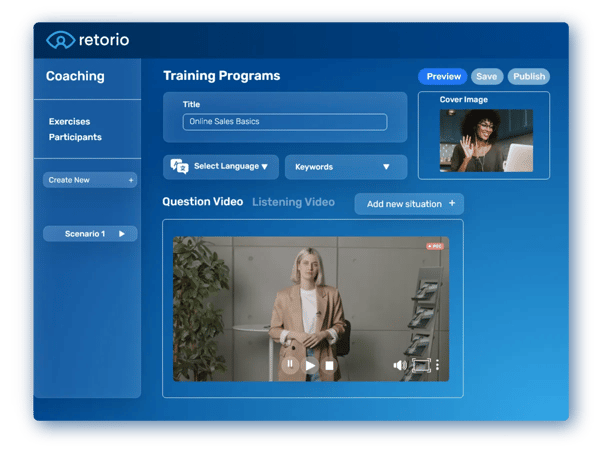Did you know that 63% of sales reps miss their quotas, and only 24% of companies believe their sales training is effective? 1
If these stats make you uneasy, you’re not alone. Sales leaders and L&D departments are grappling with shrinking budgets, inconsistent training quality, and the constant pressure to prove ROI. Are you struggling to close skill gaps in your team? Are your sales reps failing to meet targets despite hours of coaching? What if there was a way to transform your sales coaching process, making it more effective, scalable, and measurable?
Enter AI-driven sales coaching—a game-changer for modern sales teams. But before we dive into how AI can solve these challenges, let’s address the elephant in the room: Why is traditional sales coaching falling short?
In fact, effective coaching from sales managers can unlock an 8% improvement in sales performance, according to a study by Gartner.
But unfortunately, only 40% of sales reps report they work within a well-established coaching culture at their organization.
An inconsistent coaching culture can risk companies losing significant revenue opportunities and risk disengaged employees who don't feel satisfied and trained for the job.
Sales leaders need to grasp their responsibility in creating and upholding a robust coaching culture.
Good sales coaching programs provide the basis for successful sales outcomes.
This involves articulating a well-defined vision for exemplary coaching, emphasizing the significance of a coaching culture, adapting leadership practices to align with the coaching culture, and implementing and aligning processes and tools to strengthen and sustain the coaching culture.
So how can L&D managers and sales managers implement highly effective sales coaching tools that have a transformative effect on an organization's ability to generate revenue and remain competitive in the market?
In this blog, we cover essential sales coaching tips and best practices that sales management should do to continually train and sharpen their team members' skills.
What’s in this post?
- What is sales coaching?
- What are sales coaching techniques?
- How important is sales coaching?
- What are the top 10 sales coaching techniques?
- How to make an effective sales coaching program?
What is sales coaching?
Sales coaching is a process of providing guidance and support to sales professionals to facilitate and improve their performance.
It involves helping them to identify their strengths and weaknesses, setting goals, creating strategies, and providing feedback to improve their sales ability. It is an ongoing process that allows sales professionals to continually develop their skills and knowledge.
|
Feature |
Traditional Coaching |
AI Coaching |
|
Scalability |
Limited |
Highly Scalable |
|
Consistency |
Inconsistent Quality |
Consistent, High Quality |
|
Personalization |
Difficult to Personalize at Scale |
Highly Personalized |
|
ROI Measurement |
Challenging to Measure |
Measurable ROI with Data Analytics |
|
Cost-Effectiveness |
Can be Expensive |
Cost-Effective for Large Teams |
|
Efficiency |
Time-Intensive Training Delivery |
Efficient and Rapid Training Delivery |
What are sales coaching techniques?
Sales coaching techniques are designed to help sales professionals maximize their potential and drive performance. They focus on identifying areas of improvement, developing personalized strategies, and gaining an understanding of individual strengths and weaknesses.
A sales coaching program can also provide effective feedback, measurable goals, and personalized sales training to drive improvement and ensure long-term success.

How important is sales coaching?
Companies that invest in training are 57% more effective at sales than their competitors.
Sales coaching is an extremely important development tool for sales professionals. It helps to improve self-awareness, interpersonal skills, and confidence, all of which are essential for successful customer interactions and closing deals.
Sales coaching also helps to ensure organizational growth, as it helps sales representatives maximize their potential and develop specific strategies and skills needed to succeed.

Additionally, sales coaching techniques create measurable goals and provide feedback, arming sales reps with the resources they need for long-term success and higher revenue. Ultimately, sales coaching is key for individual and organizational growth and is an essential part of a well-established sales culture.
Want to learn about the different kinds of sales coaching examples? Read our article here!
What are the top 10 sales coaching techniques?Sales coaching is essential for any organization looking to drive improved performance and long-term success. It enables sales professionals to pinpoint areas of improvement, develop personalized strategies and create measurable goals that lead to better results.
Without further ado, let's get into the top 10 sales coaching tips:
| 1. Personalized Skill Assessment | Utilize AI algorithms to assess individual sales reps' strengths, weaknesses, and areas for improvement, enabling personalized coaching plans and best practices. |
| 2. Role-Play Simulations | Role-play simulations are an incredibly effective tool for training a sales rep due to their ability to replicate real-world sales scenarios and allow them to practice their interpersonal skills in a safe and monitored environment. |
| 3. Performance Analytics | Leverage analytics to gather comprehensive data on sales reps' performance, identifying patterns, trends, and areas for focused coaching and improvement. |
| 4. Natural Language Processing (NLP) | Harness NLP technology to analyze sales conversations, providing valuable insights on communication effectiveness, customer sentiment, and areas for enhancement for sales calls with customers. |
| 5. Instant, personalized coaching feedback | Deliver automated, real-time feedback to sales rep based on their performance, highlighting strengths, areas for improvement, and specific coaching recommendations. |
| 6. Adaptive Learning Paths | Create adaptive learning paths that tailor sales training content based on individual sales reps' learning pace, preferences, and skill gaps. |
| 7. Sales Pipeline Analysis | Analyze sales pipelines, identifying potential bottlenecks, areas of opportunity, and strategies to optimize the sales process. |
| 8. Virtual Sales Assistants | Integrate virtual assistants into the sales training platform, allowing a sales rep to practice engaging with virtual customers to train conversations realistically. |
| 9. Intelligent Content Recommendations | Utilize AI algorithms to recommend relevant training content, resources, and case studies to a sales rep based on their specific needs and performance data. |
| 10. Predictive Analytics | Leverage predictive analytics to forecast sales performance, enabling proactive coaching interventions and strategies to maximize sales success. |
By incorporating AI into a sales coaching strategy, organizations can unlock the full potential of their sales teams, accelerate skill development, and drive improved sales performance.
Here you can check out Retorio's immersive role-plays, and have your salespeople practice today what they face on the job tomorrow.
How to make an effective sales coaching program?
An effective sales coaching session can be created by leveraging AI technology such as Retorio, a conversational AI-driven platform that provides personalized feedback and insights into individual sales reps' performance.
Companies globally have already adopted this technology, including one of Germany's largest car manufacturers, to improve the development of their entire sales team and boost their sales performance.
By integrating AI into their sales coaching program, organizations can better understand their sales reps and sales processes, identify individual strengths and weaknesses, and create personalized training strategies and action plans that drive long-term success.
Adaptive learning paths and intelligent content recommendations can also be used to tailor content based on individual sales reps' needs and provide personalized feedback and coaching based on AI analysis.
Furthermore, predictive analytics can be used to forecast sales performance, enabling proactive coaching interventions and strategies that drive improved results. With an effective sales coaching program, organizations can develop their sales teams and maximize their potential, reducing their risk of falling behind in the market and increasing their chance of success.

AI-powered sales coaching programs...
- Enables a sales team to gain a comprehensive understanding of their individual performance and identify areas for improvement.
- Allows a sales team to analyze their strengths and weaknesses, providing them with personalized feedback and insights that can help them better understand their customer's needs and refine their strategies.
- Provides a sales team with an opportunity to practice their skills in a safe and monitored environment, allowing them to receive real-time feedback and identify their weaknesses and areas for improvement.
- Have natural language processing (NLP) technology which enables sales reps to gain insight into their communication effectiveness and customer sentiment, helping them to refine their techniques and tailor their sales calls to better meet customer needs.
- Predictive analytics allows organizations to forecast sales rep performance, enabling proactive coaching interventions and strategies to maximize sales success.
- Offer content recommendations to ensure that sales reps receive tailored training based on their specific needs and performance data, helping them accelerate their skill development and maximize their potential.
So, want to train reps to close every customer deal? Want to see how Retorio ensures reps receive relevant training so they are conversation-ready at all times?
FAQ's
A sales manager is a professional with a strategic role, responsible for leading a team of sales reps and helping them to maximize their performance. They must have an in-depth understanding of the sales process, customer service, and the latest industry trends to develop and implement effective sales strategies.
Furthermore, they are in charge of setting overall sales targets, coaching and motivating their team, and analyzing sales performance data to identify areas for improvement. Leveraging AI technology can help sales managers to better understand their sales reps, create personalized training strategies, and develop their teams to drive improved results and long-term success.
Coaching for improving sales performance is an important element of any organization's sales strategy, focused on helping sales reps develop their skills and optimize the sales process. It involves identifying potential areas for improvement and developing tailored tactics to develop the required skills and achieve the desired results.
Through active coaching, sales teams can gain insights into their individual performance, hone their abilities, and gain confidence in their ability to close deals and maximize sales success. Today, in a fast-paced post-pandemic business environment, coaching for sales performance commonly involves an AI-driven approach to optimizing the sales process and driving improved results.
By leveraging natural language processing (NLP), predictive analytics, and intelligent content recommendations, sales teams can gain insights into their performance and develop personalized training strategies tailored to individual reps' needs. Through the implementation of an effective sales coaching program, sales teams can accelerate their skill development, identify areas for improvement, and maximize their potential in order to maximize sales success.
Organizations have traditionally used sales coaches to coach their sales teams, with the coach flying in for a couple of days to provide personalized advice and training to help reps reach their goals. However, this method of training is time-consuming and costly and does not guarantee improved performance since it does not take into account individual reps' strengths and weaknesses.
To address this issue, many organizations have shifted towards online sales training methods such as webinars, e-learning courses, and video tutorials. These methods can be easier to implement and more cost-efficient, but they lack the personalized feedback and tailored strategies that reps need to maximize their performance. Now, top organizations are introducing AI-powered sales coaching strategies that leverage natural language processing (NLP) and predictive analytics to provide personalized feedback and insights that can help reps hone their skills and refine their strategies.
These AI-powered training strategies can provide sales reps with an opportunity to practice their skills in a safe and monitored environment while providing organizations with the data they need to forecast sales performance and develop personalized training strategies to maximize success.
What sales leaders should do to improve sales coaching is to implement immersive, continuous training for sales reps. When sales managers invest in this type of training, it provides reps with the opportunity to practice vital interpersonal skills in a monitored environment, allowing them to receive real-time feedback, and identify areas for improvement, which will ultimately help them with sales calls and when talking to customers.
With an effective sales coaching program in place, organizations can develop their sales teams and maximize their potential, reducing their risk of falling behind in the market and increasing their chance of success.
Effective sales coaching techniques include identifying skill gaps, shadowing top performers, role-playing and simulations, providing personalized feedback, and focusing on closing skills. Retorio’s AI coaching platform enhances these techniques by offering scalable, personalized, and measurable training solutions.
AI coaching complements traditional techniques by providing real-time, personalized feedback, ensuring consistent quality, and enabling scalability. It also offers measurable ROI through detailed analytics, making it easier to track progress and justify investments.
Retorio’s AI Coaching Generator allows teams to practice techniques like objection handling, negotiation, closing strategies, and customer engagement through realistic simulations. These exercises help refine skills in a risk-free environment.
Retorio’s AI coaching creates simulations where retail teams can practice upselling and cross-selling in realistic scenarios. The platform provides instant feedback on communication, tone, and strategy, helping reps refine their approach.
B2B sales often focus on relationship-building, negotiation, and long-term value, while B2C sales emphasize quick decision-making and emotional appeal. Retorio’s customizable simulations cater to both, ensuring relevance for diverse sales environments.
Role-playing is an important tool in mastering sales techniques because it allows sales representatives to practice in a realistic and safe environment.
The benefits of using role-playing in sales training:
- Realistic Experience AI coaching facilitates authentic role-play and simulations, simulating various client profiles and professional counterparts. This allows sales representatives to experience realistic scenarios without the pressure of a real sales environment.
- Personalized and Safe Coaching AI coaching turns large-scale training into personalized and psychologically safe coaching experiences.
- Customizable Content Training administrators can use generative AI models to create custom coaching simulations tailored to specific client situations and products.
- Behavioral Analysis AI coaching analyzes learner interactions to quantify, predict, and prescribe behavior based on video analysis. The AI Coach juxtaposes observed behavior with ideal behavior and performs a disparity analysis.
- Skill Development Role-playing helps sales representatives develop important skills.
- Discovery skills Sales representatives learn how to properly discover client needs.
- Objection handling Participants learn and practice techniques for addressing and overcoming objections.
- Negotiation skills Participants can hone their negotiation tactics.
- Solution sales Sales representatives can practice being perceived as trusted advisors.
- Confidence Building Role-playing in a safe setting helps sales representatives gain confidence.
- Feedback and Improvement
- AI coaching offers personalized and interactive learning experiences with real-time feedback, fostering higher levels of interest and participation.
- Every improvement is measured, taken note of, and communicated to the learner, ensuring that training is efficient and impactful.
- The AI compares the learner's behavior with winning strategies and recommends actionable insights for improvement.
- Quantifiable Results
- AI coaching by Retorio outputs clear, replicable metrics, which allows aligning the training results with business metrics and synchronizing them with company goals and strategic objectives.
- AI-powered tools provide insights into behavioral changes and long-term impact.
- Accessibility Given the cloud-based nature of AI coaching, learning can occur anywhere and at any time.
Retorio's AI coaching platform can be used to practice and master several retail-specific sales techniques. These techniques can help retail sales teams improve engagement, drive sales, and enhance customer satisfaction.
Retail-specific sales techniques that can be practiced with Retorio:
- Greeting Customers Retorio can simulate scenarios where learners practice greeting customers in hotels, airplanes, and retail stores. This helps in mastering hospitality and creating a positive first impression.
- Discovery Using Retorio, sales representatives can practice discovering customer needs.
- Pitching Retorio can assist with practicing how to pitch a company and its products. This includes tailoring the pitch to the customer and highlighting key benefits.
- Objection Handling Sales reps can use Retorio to learn how to handle objections, which is a key skill for converting prospects into customers.
- Upselling Retorio allows practicing upselling techniques in various contexts such as car rentals, hotels, and telecommunications. This involves persuading customers to purchase a more expensive item or upgrade a product or service.
- Cross-selling Retorio enables practicing cross-selling techniques. Sales teams can learn how to recommend related products or services to enhance the customer's purchase.
By using Retorio to simulate these scenarios, retail sales teams can improve their skills, resulting in better performance and customer experiences. The AI coaching provides personalized feedback, quantifies behavioral changes, and aligns training results with business metrics, ensuring a measurable impact on sales and customer satisfaction.
Retorio's AI coaching helps teams master consultative sales techniques by providing a platform that facilitates personalized, data-driven training and skill development. Consultative selling involves building trust and acting as a trusted advisor, which requires specific communication and relational skills.
Here's how Retorio supports the development of these techniques:
- Customized simulations Training administrators can use Retorio’s generative AI to create custom coaching simulations tailored to specific client situations and products, enabling sales representatives to practice real-world scenarios.
- Discovery skills Retorio simulations allow sales representatives to practice discovering customer needs.
- Personalized feedback The AI offers personalized and interactive learning experiences with real-time feedback, adapting to individual needs and fostering engagement.
- Behavioral analysis Retorio's AI analyzes learner interactions to quantify, predict, and prescribe behavior based on video analysis. The AI compares observed behavior with ideal behavior and performs a disparity analysis, providing insights into areas for improvement.
- Objective assessment AI coaches focus solely on behavior, disregarding demographics like age, gender, or ethnicity, ensuring unbiased recommendations.
- Quantifiable results Retorio's AI coaching provides clear, replicable metrics, aligning training results with business metrics and synchronizing them with company goals.
- Accessibility The cloud-based nature of AI coaching allows for anywhere, anytime learning, fitting into the schedules of busy sales professionals.
By using Retorio, sales teams can refine their consultative selling skills, leading to enhanced performance and stronger client relationships.
Yes, Retorio can help teams practice sales techniques for different industries.
Here are some ways that Retorio can help teams practice sales techniques for different industries:
- Customizable content Training administrators can use generative AI models to create custom coaching simulations tailored to specific client situations and products. This allows sales representatives to practice real-world scenarios relevant to their industry.
- Versatility AI coaches possess remarkable versatility, seamlessly integrating into existing workflows. They facilitate authentic role plays and simulations by simulating various client profiles and professional counterparts.
- Industry-specific best practices AI platforms like Retorio provide pre-generated coaching simulations created by experts and coaches. Best practices are shared among multiple clients, such as insurance companies for sales training or enterprises for performance management reviews. Proven simulations can be easily adapted.
- Data-Driven Insights AI coaching learns from experienced people and shares their winning behaviors.
- Personalized feedback The AI offers personalized and interactive learning experiences with real-time feedback, adapting to individual needs and fostering engagement.
- Objectivity AI coaches focus solely on behavior, disregarding demographics like age, gender, or ethnicity, ensuring unbiased recommendations.
- Quantifiable results Retorio's AI coaching provides clear, replicable metrics, aligning training results with business metrics and synchronizing them with company goals.
- Accessibility The cloud-based nature of AI coaching allows for anywhere, anytime learning, fitting into the schedules of busy sales professionals.
Retorio's clientele routinely evaluates the efficacy of Retorio across diverse sets of Key Performance Indicators (KPIs). These KPIs encompass top-line metrics such as influence on revenue generation and quota attainment, as well as bottom-line metrics such as cost savings and operational metrics such as time-to-market. The business impact of AI coaching varies across different client organizations, use cases, and user groups, making generalizations challenging.






